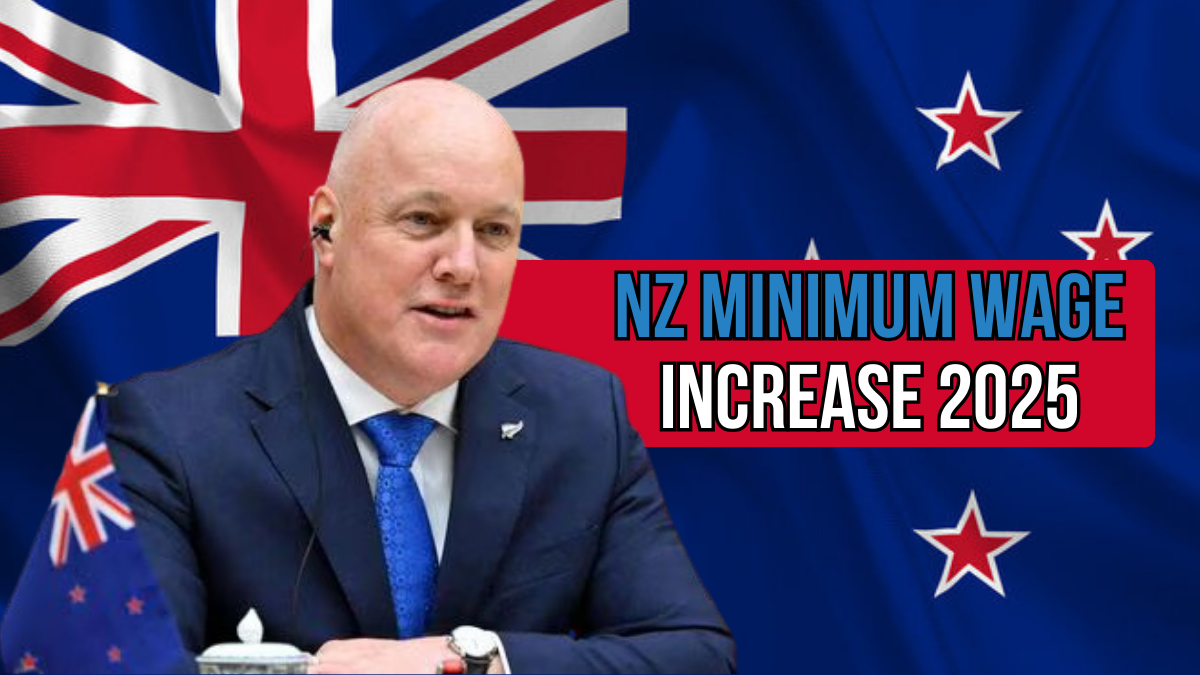The New Zealand government has officially confirmed that the minimum wage will rise on 1 September 2025. This adjustment comes as part of an annual review aimed at balancing worker welfare with business sustainability. While the increase is modest, it reflects steady progress in managing inflation and ensuring fair pay for low-income workers.

This article provides a complete breakdown of the new minimum wage rates, employer obligations, exemptions, and preparation tips to help both employees and businesses adapt smoothly.
Why Is the Minimum Wage Increasing in 2025?
The government reviews the minimum wage annually to ensure it reflects economic realities. For 2025:
- Inflation is stabilising: The Reserve Bank confirmed inflation has returned to its target band after three years of volatility.
- Living costs are rising: Food, housing, and healthcare remain significant expenses for low-income households.
- Fair pay standards: The increase ensures that wages do not stagnate, helping protect workers’ purchasing power.
The rise of 35 cents per hour represents a 1.5% increase, which is smaller than some previous years but still provides measurable relief.
Quick Summary: NZ Minimum Wage Increase 2025
| Aspect | Details |
|---|---|
| Effective Date | 1 September 2025 |
| Adult Minimum Wage | $23.50 per hour (up from $23.25) |
| Training/Starting Wage | $18.80 per hour (up from $18.52) |
| Weekly Impact | +$14 per week before tax for a 40-hour worker |
| Workers Affected | Around 141,900 employees |
| Exemptions | Possible for disabled employees (via Labour Inspectorate permit) |
| Official Source | Employment New Zealand |
New Wage Rates from 1 September 2025
- Adult Minimum Wage
- Increases from $23.25 to $23.50 per hour.
- A 40-hour worker will earn $940 per week before tax.
- Training and Starting Minimum Wage
- Increases from $18.52 to $18.80 per hour.
- These wages remain pegged at 80% of the adult rate.
- Annual Impact
- A full-time adult worker on the minimum wage will earn approximately $728 more annually before tax.
Minimum Wage Exemptions
New Zealand allows exemptions for workers with disabilities under specific conditions:
- Employers can apply to the Labour Inspectorate for a minimum wage exemption permit.
- The exemption applies only if:
- The disability significantly limits the employee’s ability to perform job duties.
- The arrangement is reasonable and agreed upon by the employee.
- The employer has taken steps to support the employee in performing their work.
This ensures fairness while providing flexibility for employees with different needs.
How Employers Should Prepare
With the new rates taking effect from September 2025, employers must act promptly:
1. Inform Employees
Send formal letters or emails updating employees on their new wage rates. Variations to employment agreements may be required.
2. Update Payroll Systems
- Ensure payroll software, HR records, and contracts reflect the updated minimum wages.
- Check start and training wage transitions for eligible staff moving to adult rates.
3. Consider Pay Relativity
- Evaluate how the increase affects wage gaps within your organisation.
- Higher-paid staff may expect adjustments to maintain pay relativity.
4. Revise Budgets
- Update short- and medium-term budgets to reflect increased wage expenses.
- Account for additional holiday pay liabilities due to higher base pay.
5. Stay Compliant
- The minimum wage applies to all hours worked, regardless of whether the employee is paid hourly, on salary, commission, or piece rates.
- Employers must ensure lawful deductions only (e.g., PAYE tax, student loans, child support).
Who Does the Minimum Wage Apply To?
- Applies to:
- Adult workers (aged 16 and over).
- Training and starting-out employees.
- Workers on hourly, salary, commission, or piece-rate contracts.
- Does not apply to:
- Employees under 16 years of age.
- Employees with an approved minimum wage exemption permit.
Broader Implications
The 2025 increase will impact:
- Workers: Over 141,900 employees will see higher pay, supporting basic living costs.
- Businesses: Increased payroll costs, particularly for small businesses, may lead to tighter margins.
- Economy: Higher wages may stimulate consumer spending but could also raise operational costs for employers.
FAQs About NZ Minimum Wage Increase 2025
1. What is the new adult minimum wage in New Zealand from September 2025?
The adult minimum wage will increase to $23.50 per hour.
2. What are the training and starting-out minimum wages?
They will increase to $18.80 per hour, remaining at 80% of the adult rate.
3. How many workers will benefit from the increase?
Approximately 141,900 workers will see higher pay.
4. Are there exemptions from the minimum wage?
Yes, exemptions may apply for employees with disabilities, but only with a permit from the Labour Inspectorate.
5. How should employers prepare for the increase?
Employers should update payroll systems, inform staff, review budgets, and ensure compliance with minimum wage obligations.
Conclusion
The NZ Minimum Wage Increase 2025 ensures continued protection for workers while keeping adjustments modest to balance economic stability. From 1 September 2025, the adult minimum wage rises to $23.50 per hour, while training and starting-out rates increase to $18.80.
Employers must prepare by updating payroll, revising budgets, and informing staff. Meanwhile, employees can look forward to slightly higher take-home pay, offering modest relief from living costs.
For full compliance guidelines and official updates, visit Employment New Zealand.
For More Information Click HERE